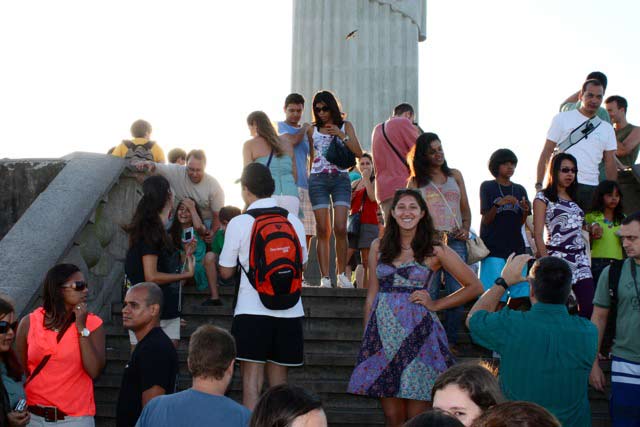
Since arrival in Rio at the beginning of this year, I have, for the most part, made a constant effort to be treated as a person living, studying, and teaching here, not as a tourist. That all changed on December 9. For the first time in a year, my parents, sister, and I united, this time not in my hometown in New York or in Santa Barbara, but in Rio de Janeiro.
Upon arrival, John, Annie, and Emily Bachman didn’t speak a speck of Portuguese, and were as transparent as any upstate New Yorker in the winter. Needless to say, they stood out like three sore thumbs. Better: We stood out like four gringos in Brazil.
(It is slightly consoling that, unlike anywhere else in the world, “gringo” refers not only to people from the USA, but to any non-Brazilian. Japanese, Australians, French, and Russians are gringos too. The only thing worse is an Argentinean.)

From the hike from the beach in Ipanema to their Bed and Breakfast dragging rolling suitcases, to navigating the streets of Rocinha, the favela in which I’ve been living, striding the streets with my soar thumb crew was quite the feat. It’s not that Brazilians are unwelcoming – on the contrary. They are famous for their warmth toward foreigners. The attention called by doing everyday activities with only-English-speaking adults is, speaking strictly for me, exhausting.
The language barrier is a given. About Brazilian Portuguese, my sister Emily, who speaks Spanish but had never heard Portuguese, said: “It sounds weird … sounds so foreign. I know it looks like Spanish, but it sounds so different!” Before I provided some useful phrases and explained some of the phonetic differences and characteristics of the Rio accent, she called it “as foreign as Chinese!” While the language certainly doesn’t get in the way of tourists spending money, it does occasionally result in tourists being taken advantage of, whether paying for a caiparinha or taxi.

I wanted to show my family the Rio-defining beach experience. We set out for the beach one Saturday morning and set up camp with the help of one of the many family-run tent concerns along the crowded beaches. Adriano set up for us two chairs at R$3 apiece, and an umbrella for R$5, and started our tab. My parents were surprised at the laxness of the payment system. “We could easily just walk away without paying. How do they know we won’t do that?” commented my mom. Instead, Adriano and his brother Michael ran back and forth from our and about a hundred other peoples’ patches of sand adding bottles of water, cans of beer, and snacks to our tabs throughout the day. We paid when we left hours later.
In addition to the services of Adriano and Michael, my family was entertained by the constant army of vendors that walk up and down the beach throughout the day selling bikinis, cangas (sarongs), jewelry, ice cold matte, and Globos, the doughnut-shaped, air-puffed, crunchy Rio de Janeiro beach snack. Emily took advantage by investing in an excellent Brazilian bikini.

My family’s visit also allowed me to indulge in some of Rio’s most famous tourist activities for the first time. Pão de Açucar, or Sugarloaf Mountain, is one such attraction. It’s a tall, slender rock that rises 393 m (1,299 ft) from the sea in the middle of the city. While it is not the highest viewpoint in the city, the view from the top, which is reached by cable car, offers a panoramic perspective of Rio de Janeiro’s bumpy, jungle-blanketed landscape. It was way up there that my mom offered a monolog of her impressions: “You know, this might be the most beautiful city that I have ever visited in the world. I mean, people call Paris a beautiful city. But Paris is just architecture and a river. Look at all these mountains and rocks!”
Emily had been similarly awestruck a few days earlier. The current president of Wake Forest University’s Environmental Club, who has a degree pending in anthropology with a minor in environmental studies, she was in heaven surrounded by so much greenery. “There are trees absolutely everywhere!” she exclaimed. “There’s green life bursting out of every nook and cranny it can find!”

Some days we were not so lucky as far as clear skies and sunshine. We took a couple-day excursion to Ilha Grande, an historically fascinating island to the west of the city, off the coast of Rio de Janeiro state, where we met some classic Brazilian tropical rain. It was on one particular walk back to our hostel through power outage-induced pitch-blackness in torrential downpour that my parents began their trip-long tradition of quoting an Ilha Grande guidebook through which we had been leafing: “Rain and insects should not be considered inconveniences but are to be admired.” The quote became increasingly appropriate through our next couple days of hiking on the mountainous island through mud and rain.
All in all, my family’s trip to Rio de Janeiro was full of all the appropriate extremities. Confusions with Portuguese were countered by bilingual tourist activities. Intense sun and heat were met by thick rain and mud. And the animated tourist welcomes were challenged by the inevitable attempts by locals to take advantage of the gringos.
John, Annie, and Emily Bachman left this evening for New York, to enjoy the remainder of the holidays in English-speaking snow-covered paradise. Meanwhile, I’ll be enjoying my last couple weeks in Rio de Janeiro, trying my best to blend back in.



